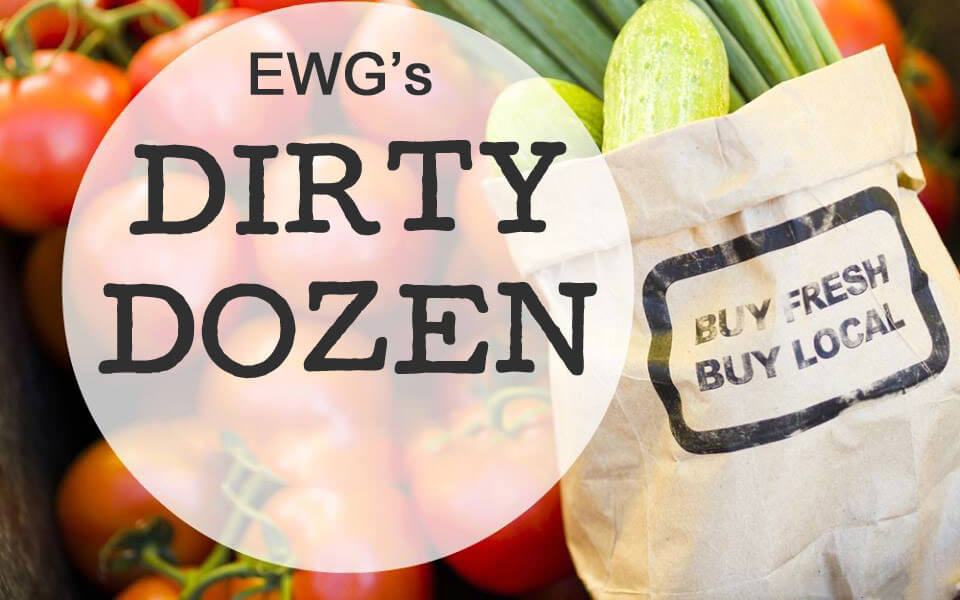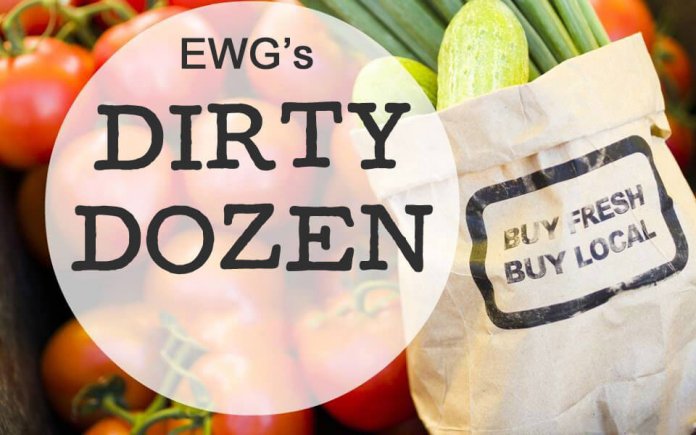Pesticides can be useful and dangerous. They are essential for farmers to protect plants from insect pests, fungi, mold and other threats. In this case, the dose of pesticides contained in the product affects its toxicity. In small doses, pesticides can be harmless, but if they accumulate in the human body, then this is clearly not good for health. However, the long-term effects of consuming food with pesticides on a daily basis are unknown.
The Environmental Working Group (EWG) of the United States has released an annual Dirty Dozen - ranking of the most pesticide-contaminated plant foods... It has been published since 1993 and has been used in dietary guidelines by many renowned physicians and medical organizations, including the American Academy of Pediatrics.
 In total, 48 of the most popular vegetables and fruits were analyzed, and in 70% of them traces of at least one chemical were found. However, more than 98 percent of samples of strawberries, spinach, peaches, nectarines, cherries and apples tested positive for traces of at least one pesticide. Pesticide residues remained on fruits and vegetables even after they were washed and, in some cases, cleaned up. We present you with the top 10 products with the highest pesticide content according to the 2017 EWG.
In total, 48 of the most popular vegetables and fruits were analyzed, and in 70% of them traces of at least one chemical were found. However, more than 98 percent of samples of strawberries, spinach, peaches, nectarines, cherries and apples tested positive for traces of at least one pesticide. Pesticide residues remained on fruits and vegetables even after they were washed and, in some cases, cleaned up. We present you with the top 10 products with the highest pesticide content according to the 2017 EWG.
10. Tomatoes
Opens the "dirty" top ten product, without which most salad recipes are unthinkable. In 2016 Dirty Dozen, he was ranked ninth.
9. Celery
In 2016, this vegetable was in fifth place. Well, in the case of Dirty Dozen, the further from the first position a product is, the better for those who eat it.
8. Grapes
Moved from 6th place in last year's ranking to 8th. This means that the grapes selected by the EWG had fewer traces of pesticides compared to the 2016 data.
7. Sweet cherry
The Persistent Pesticide Soldier - as it was in 7th place in 2016, it remains on it on the current list.
6. Pears
More than half of the samples tested contained traces of five or more different pesticides. Including carbendazim acetamiprid, imidacloprid and diphenylamine.
5. Peaches
In 2016, peaches were in fourth place in the pesticide anti-ranking. This year, they contain fewer substances harmful to health, which cannot but please the lovers of these fruits.
4. Apples
Last year, apples were in second position in Dirty Dozen, and before that, they were the leaders of the list for five years. This year they were only in fourth place, losing first place to strawberries.
3. Nectarines
Almost all tested samples of these tasty and juicy fruits tested positive for the presence of at least one pesticide.
2. Spinach
Spinach samples had, on average, twice as much pesticide residues by weight as any other vegetable or fruit tested in the Dirty Dozen study. Three-quarters of the spinach samples contained residues of DDT, a neurotoxic insecticide. According to recent studies, it causes behavioral disorders in young children.However, most of the pesticides found in spinach samples are considered safe.
1. Strawberries
Topping the rating of "dirty" plant products is the beloved by many false berries (in fact, strawberries belong to many-nuts). One batch of strawberries tested contained 20 different pesticides. What explains the staggering amount of pesticides in the little strawberries? Off-season demand. Strawberries once produced a seasonal, limited crop, but heavy use of pesticides has increased yields and extended the growing season. In California, where most American strawberries are grown, there are 135 kg of pesticides per acre processed.
And the cleanest were: sweet corn, avocado, pineapple, cabbage, onion, frozen sweet peas, papaya, asparagus, mango, and eggplant. Only 1% of avocado and sweet corn samples contained any identifiable pesticide, so they are considered to be the purest product.
The EWG rating is aimed at guiding buyers towards purchasing the cleanest products in terms of chemical content. EWG experts urge the purchase of organic products (i.e. no GMOs, synthetic chemicals and fertilizers). This is especially important for pregnant women and families with children, as even low levels of exposure to pesticides can be harmful to a fragile or heavily stressed body. But if your budget does not allow for frequent purchases of organic products, or they are rarely on sale, this selection of “clean” and “dirty” foods will help you minimize your consumption of the most contaminated fruits and vegetables.
Video version of last year's ranking of pesticide products

